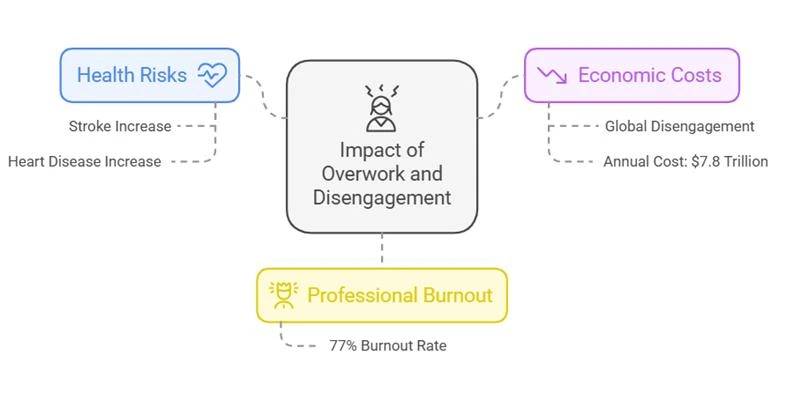Months after Infosys co-founder Narayana Murthy promoted 70-hour workweeks for Indian professionals in an effort to boost national productivity, L&T chairman S.N. Subrahmanyan’s remark advocating a 90-hour work week has ignited debate across corporate landscape. Proponents argue that putting in extra hours is essential to outpace global competition, while critics warn that such demands can quickly breed burnout and disillusionment, especially among Millennials and Gen Z.
As an HR professional with a front-row seat to these discussions, I can’t help but question: Are we risking our workforce’s mental well-being and long-term innovation for the sake of perceived productivity gains? Below, I am going to talk about, why this debate matters for any organization seeking to attract and retain next-generation talent.
More Hours = Greater Output?
Leaders pushing for a 90-hour workweek often cite examples like China’s “996” culture (9 a.m. to 9 p.m., six days a week) or the Silicon Valley hustle mentality. They argue it’s a necessary sacrifice for India—or any emerging economy—to maintain competitive advantage.
But let’s be clear: The road to innovation isn’t paved solely by raw hours. If that were the case, every overworked team would produce groundbreaking solutions. In reality, “too many hours” can actually stifle creativity. Studies from Harvard Business Review show that fatigue impairs decision-making and problem-solving skills, leading to diminishing returns.
Impact of Overwork and Disengagement

- Health Risks (WHO Study): Increase in Stroke and heart disease by 35%
- Economic Costs (Gallup Poll): Global Disengagement, Annual Cost: $7.8 Trillion
- Professional Burnout (Deloitte survey): 77% Burnout Rate
The Rising Influence of Millennials & Gen Z
We’re no longer dealing with a workforce that accepts “burning the midnight oil” as the only path to success. Millennials and Gen Z, who now dominate large segment of our talent pool, have grown up in an era where mental health discussions are not only common but valued.
- Purpose Over Paychecks: They’d rather work for companies that respect work-life balance, diversity, and personal growth.
- Boundaries Are Non-Negotiable: Many younger professionals see relentless hours as a sign that leadership is out of touch—or worse, indifferent to their well-being.
Demanding 90-hour workweeks can easily morph into record-high turnover among these demographics, undoing any short-term productivity gains. As an HR professional, I’ve seen first-hand how quickly burnout sours high-potential employees on the idea of staying, let alone giving their all.
You May Also Like: Tips to Optimize Work-Life Integration for Success
Where Does This Leave HR?
1. Challenging “One-Size-Fits-All” Thinking
HR leaders must question: Does every role truly require 70/90 hours of work per week? Likely not. Pushing every department—finance, marketing, creative—to adopt an “extreme hustle” can crush morale and compromise quality.
2. Designing Sustainable Cultures
Culture is shaped from the top. If a CEO publicly endorses gruelling schedules, it trickles down, whether we like it or not. We must advocate for data-driven results, flexible work arrangements, and genuine recognition programs that reward efficiency and innovation over mere “face time.”
3. Deploying Mental Health Measures
If leadership insists on rigorous hours, HR needs a robust safety net for employees—therapies, counselling, burnout prevention workshops, and candid feedback channels. Ultimately, overwork without proactive mental health support is a ticking time bomb.
A Personal Appeal to Leaders
To the leaders championing relentless work schedules: I respect your passion for progress and your drive to see India (or your company) excel. But let’s not forget that a truly unstoppable organization is one where employees feel valued and supported. Overwork might yield short-term gains, but the longer-term damage can be profound: mass resignations, tarnished employer brand, and a culture of fear.
Also Read: Long Hours Vs Productivity – Tips to Become More Productive
A Middle Ground: “Sustainable Ambition”
- Align hours with role-specific demands—some roles peak at certain project phases but don’t require perpetual overdrive.
- Invest in training and technology so employees can accomplish tasks faster and smarter, not just longer.
- Build an environment where employees feel safe to say, “I need a break,” without fear of retribution.
Parting Thoughts
The 90-hour workweek debate is more than just a media sound bite. It’s a litmus test for how we envision the future of work. Are we, as leaders and HRs prepared to strike a sustainable balance that promotes both performance and mental health? Or will we double down on a model that might drive short-term gains—yet erode the very foundations of a vibrant, enduring workforce?
I’d love to hear your thoughts and experiences. Are you ready to embrace a results-first culture rather than an hours-first culture? If so, let’s make sure our policies, practices, and leadership messages align with that vision.




